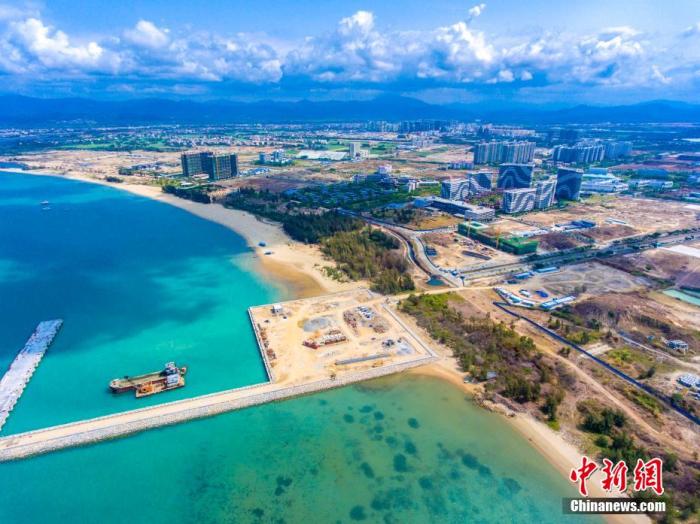China News Service, April 26. According to the website of the Ministry of Commerce, on April 23, the Ministry of Commerce and other 20 departments jointly issued the "Notice on Several Measures to Promote Trade Liberalization and Facilitation of Hainan Free Trade Port" (hereinafter referred to as the "Notice" ).
The "Notice" clarified 28 policy measures from the two aspects of trade in goods and trade in services, including the promotion of pilot projects for the innovative development of trade in services, and support for the development of digital trade.
Data map: Aerial photography of major projects of Sanya Yazhou Bay Science and Technology City is stepping up construction.
Photo by Luo Yunfei
There are 13 policy measures in the area of trade in goods.
Among them, the liberalization of trade in goods includes: the first pilot in the Yangpu Free Trade Port area through the "first-line" import and export of crude oil and refined oil is not subject to enterprise qualification and quantity management, imported sugar is not included in the total tariff quota management, and the decentralization of international shipping vessels for bonded refueling License authority, enter the "first line" in areas where the "first line" is liberalized and the "second line" is controlled. In principle, the automatic import license management will be cancelled, the electromechanical import license management measures will be cancelled, and the development of second-hand car export business and new offshore international trade will be supported. 7 policy measures.
The facilitation of trade in goods includes: supporting the development of pilot qualification examination and approval of relevant certification bodies, improving the quality and safety risk early warning and rapid response supervision capabilities of imported and exported goods, strengthening the innovation of customs supervision mode, implementing the level of examination and approval mode, and supporting participation in the formulation of recommended national standards and local formulations. Standards and group standards, six policy measures including the establishment of a work station to deal with trade frictions and a trade adjustment assistance mechanism.
There are 15 policy measures in service trade.
Among them, the liberalization of service trade includes: allowing foreign institutions to independently organize foreign-related economic and technological exhibitions other than the names "China", "China", "National", and "Country". There is no need to file foreign trade operators for technology import and export operations. Registration, exploring the cancellation of the establishment of auction companies, reviewing licenses and commercial franchising records, advancing pilot projects for the innovative development of service trade, and supporting the development of digital trade and other 6 policy measures.
The facilitation of service trade includes: establishing a rapid response channel for technology import and export security management ministries and provinces, taking the lead in regulating domestic regulations that affect the freedom and convenience of service trade in some key areas, successfully hosting the China International Consumer Goods Expo, supporting the creation of a national cultural export base, and building a country The foreign cultural trade base promotes the establishment of key enterprises and projects, encourages innovative service trade international cooperation models, supports the development needs of the Hainan Free Trade Port when signing new service trade international cooperation agreements, and improves 9 policy measures including the international service trade statistics and monitoring system.

